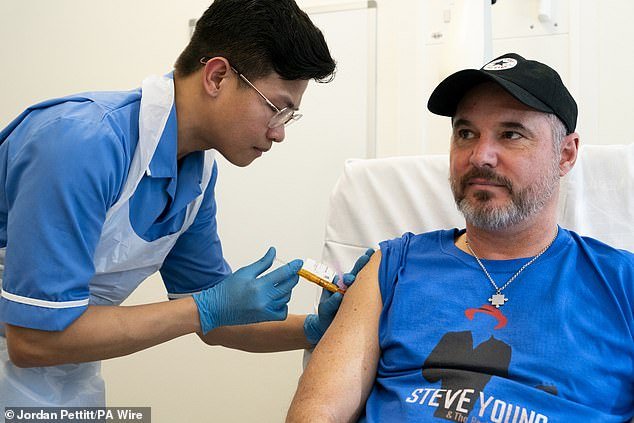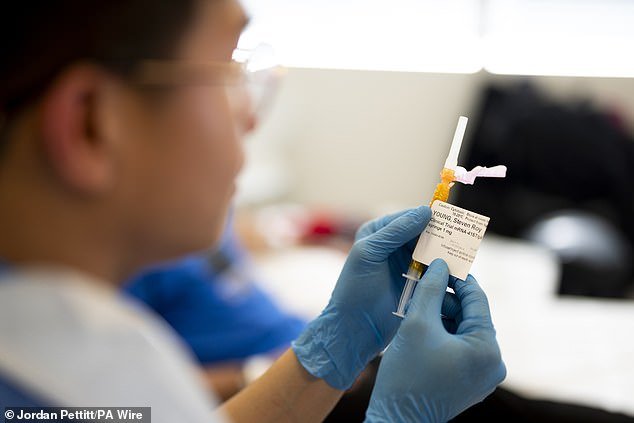New £400,000 melanoma vaccine heralds the start of a ‘cancer renaissance’ as Britain tests personalized injections for lung, bowel, pancreas and liver tumors… but experts fear the NHS can’t afford them
Britain is entering a ‘cancer renaissance’ with groundbreaking personalized vaccines to fight some of the deadliest tumors expected by 2030, leading experts say.
Studies are already underway in which patients with lung, liver, kidney, colon and pancreatic cancer can receive injections that can prevent the disease from returning.
A partnership announced last year between the NHS and cancer vaccine developers will mean UK patients get priority access to these groundbreaking medicines.
The tailor-made jabs, made using the same technology behind the Covid vaccines, train the body to detect cancer cells and prevent the disease from returning.
However, there are questions over the affordability of the treatment, which costs around £400,000 per patient, insiders have told MailOnline.
Steve Young, 52, from Stevenage, is among the first patients to take part in the melanoma vaccine trial at University College Hospital London

Steve receives his first melanoma shot at University College London Hospital by nurse Christian Medina
The news comes after an announcement today that the first personalized vaccine against melanoma skin cancer was being trialled in NHS patients.
The first results suggest that the jab can drastically improve the survival chances of patients with the disease – the deadliest form of skin cancer.
One patient who has already received the vaccine, Steve Young, 52, from Stevenage, described it as his ‘best chance of stopping the cancer’.
Mr Young was diagnosed with melanoma after a bump on his head – which he thinks he had had for about 10 years – turned out to be cancer.
However, experts say melanoma is just one of many cancers that can be cured thanks to personalized vaccines.
“These vaccines could help cancer patients across the board,” said Dr. Lennard Lee, a cancer vaccine expert at the University of Oxford.
‘This is a new technology that we didn’t have before and that could save the lives of patients.
‘Studies are already underway for head and neck, bowel, pancreas, lung and liver cancer, and the numbers will only increase from month to month, year to year.
‘It is an entire medical field that came into existence out of nowhere. It feels like Britain is entering a renaissance in cancer treatment.”
Professor Lee added: ‘Drug makers are all targeting 2030 as the year these vaccines will come to market.’
Cancer vaccines are designed to target specific genetic mutations found in the cancer cells.
This means that if the cancer returns, the immune system will immediately detect the cancer and destroy the cells before they have time to spread.
To make the injection, a tumor sample is removed from the patient during surgery.
This is then sent to a laboratory where the tumor genes are sequenced to identify certain proteins produced by cancer cells, known as neoantigens, which will trigger an immune response.
These are then used to create an individualized mRNA vaccine – the same cutting-edge technology used to develop various Covid jabs.
The vaccine tells the patient’s body to generate the tumor-specific neoantigens, which in turn train the immune system to recognize and attack the tumor cells.
Data published last year showed that a small study found that patients at high risk for melanoma who received the new shot alongside another immune-boosting drug were almost half as likely to die or have their cancer change after three years would come back, compared to those just taking the immunotherapy.
Patients must receive a new injection every three weeks for a year, in addition to a course of immunotherapy.
However, experts say they are particularly excited about the vaccines’ potential to help cure patients with pancreatic cancer — a deadly form of the disease with few effective treatments.
About 10,000 patients are diagnosed with pancreatic cancer every year, and about the same number die from it every year.
The condition is so deadly because it is often diagnosed late due to a lack of obvious symptoms.
Only about five percent of patients will survive the disease for more than ten years.
Earlier this month, new data from a study in which mRNA vaccines were given to pancreas patients after surgery showed signs that it induced a strong immune response that would reduce the risk of the disease returning.
A larger study, involving 260 patients, is now underway.
‘We have come a long way in the treatment of melanoma in recent years and we can cure around half of all patients,’ says Professor Tom Powles, director of Barts’ Cancer Center.
‘But there is simply nothing that works against pancreatic cancer.
‘If cancer vaccines are given to patients early enough, they could open a new chapter for pancreatic patients by reducing the risk of the disease returning.
“If I were a pancreatic cancer patient, this is the trial I would want to do.”
However, there are concerns about the cost of the vaccine.
“Currently it costs around $500,000 (£399,000) to develop each series of jabs,” said an industry source.

The jabs use the same mRNA-based technology as in the Covid vaccine to harness the body’s immune system and kill cancer
‘At that price the NHS will struggle to afford them.
“The pharmaceutical companies will have to find a way to make the vaccines commercially viable.”
But experts say the NHS’s partnership with vaccine developers Moderna and BioNTech, which will see thousands of British patients take part in their trials, could give Brits access to these new treatments earlier than those in other countries.
‘In the coming years, NHS cancer patients can expect more opportunities to take part in these vaccine trials,’ says Dr Lee.
“These are opportunities that patients may not get elsewhere.”

